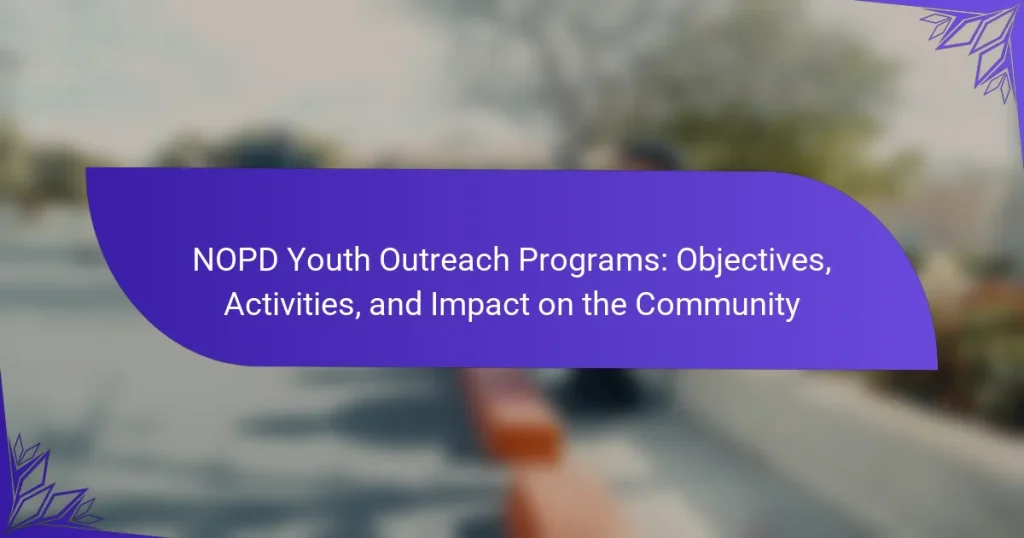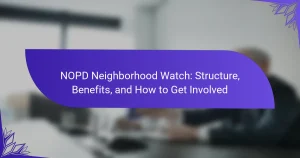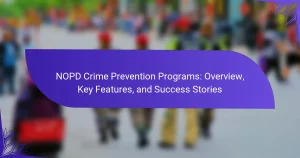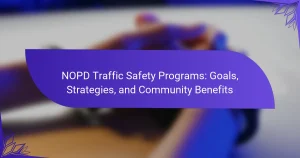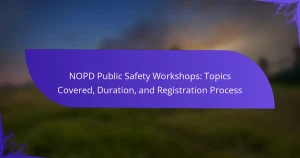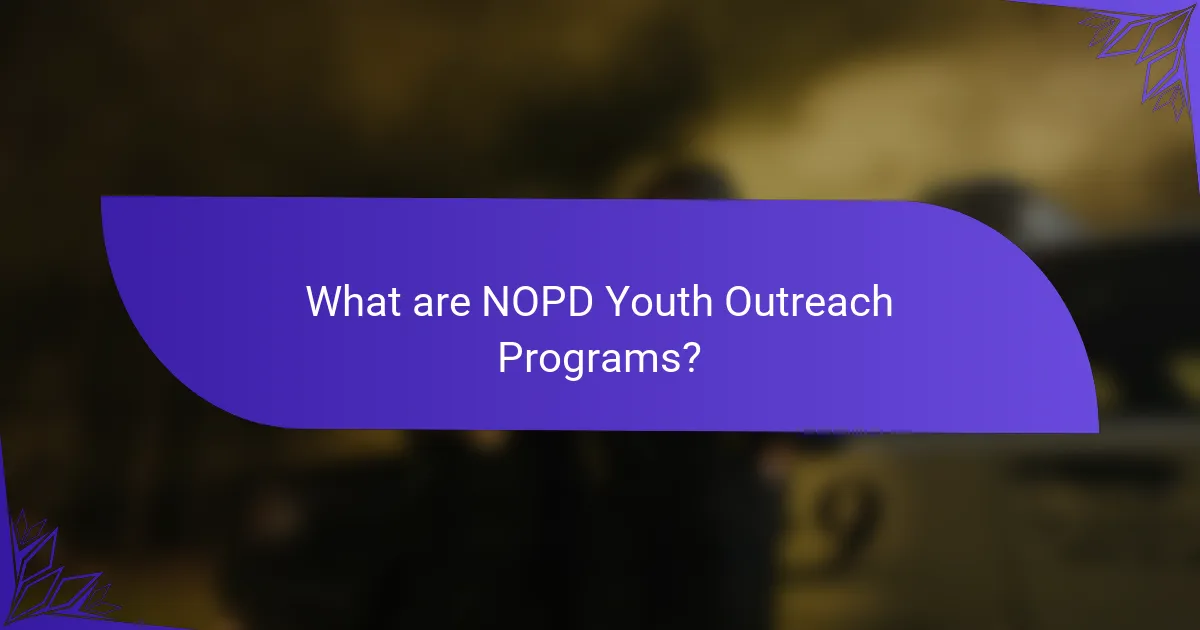
What are NOPD Youth Outreach Programs?
NOPD Youth Outreach Programs are initiatives by the New Orleans Police Department aimed at engaging youth in the community. These programs focus on building positive relationships between police officers and young people. They provide mentorship, education, and recreational activities. The goal is to reduce crime and improve community relations. Programs often include workshops, sports events, and community service projects. Evidence shows that such outreach efforts can lead to decreased juvenile crime rates. Studies indicate that positive interactions with law enforcement can foster trust and cooperation.
How do NOPD Youth Outreach Programs operate?
NOPD Youth Outreach Programs operate by engaging with young people in the community to build positive relationships. These programs provide mentorship, education, and recreational activities. Officers involved in the outreach actively participate in local events and schools. They aim to create trust between law enforcement and youth. The programs also focus on crime prevention and personal development. Activities include workshops, sports, and community service projects. Data shows that such initiatives can reduce juvenile crime rates. The programs are designed to empower youth and promote a sense of belonging.
What are the key components of NOPD Youth Outreach Programs?
The key components of NOPD Youth Outreach Programs include mentorship, educational workshops, and community engagement activities. Mentorship provides guidance and support to youth from police officers. Educational workshops cover topics such as conflict resolution and personal development. Community engagement activities foster positive interactions between youth and law enforcement. These components aim to build trust and reduce juvenile crime. Programs often include recreational activities to promote teamwork and leadership skills. They also involve partnerships with local schools and organizations to enhance resources. Overall, these components work together to create a supportive environment for youth in the community.
How do these components contribute to program effectiveness?
The components of NOPD Youth Outreach Programs enhance program effectiveness by fostering community engagement and building trust. Engaging youth through targeted activities helps in addressing specific needs. Trust-building between law enforcement and the community leads to greater cooperation. Programs that include mentorship provide positive role models for participants. Evidence shows that youth who engage in structured activities are less likely to engage in delinquency. Additionally, collaboration with local organizations amplifies resources and support. These combined efforts create a comprehensive approach that effectively addresses youth challenges.
What objectives do NOPD Youth Outreach Programs aim to achieve?
NOPD Youth Outreach Programs aim to build positive relationships between youth and law enforcement. They focus on crime prevention and reducing juvenile delinquency. Programs offer mentorship and educational opportunities. They provide resources for personal development and community engagement. These initiatives also aim to promote safety and awareness in the community. By fostering trust, they seek to enhance cooperation between youth and police. Evidence shows that such outreach improves community relations and reduces crime rates. Programs have successfully engaged hundreds of local youth annually.
How do these objectives align with community needs?
The objectives of NOPD Youth Outreach Programs align with community needs by addressing youth violence and promoting positive engagement. These programs provide mentorship and resources that foster personal development. They aim to reduce crime rates by offering alternatives to gang involvement. Community feedback indicates a desire for increased youth support and safety initiatives. Statistics show that areas with active youth programs experience lower crime rates. The alignment is evident in the community’s call for proactive measures to engage at-risk youth. This connection enhances trust between law enforcement and the community, fostering a collaborative environment.
What specific goals are set for participant engagement?
Specific goals for participant engagement in NOPD Youth Outreach Programs include fostering positive relationships between youth and police. These goals aim to build trust and improve community safety. Engaging youth in constructive activities helps to reduce crime rates. Programs often focus on skill development and mentorship. They encourage active participation in community events. Goals also include enhancing youth leadership and civic responsibility. These objectives are supported by community feedback and program evaluations. Engaging youth effectively can lead to long-term positive changes in community dynamics.
What types of activities are included in NOPD Youth Outreach Programs?
NOPD Youth Outreach Programs include various activities designed to engage youth positively. These activities often involve mentorship, educational workshops, and recreational events. Mentorship programs connect youth with police officers to build trust and understanding. Educational workshops cover topics like conflict resolution and leadership skills. Recreational events may include sports, art, and community service projects. These activities aim to foster relationships between youth and law enforcement. They also promote personal development and community involvement. The programs are structured to provide a safe and supportive environment for participants.
How do educational activities benefit youth participants?
Educational activities benefit youth participants by enhancing their knowledge and skills. These activities promote critical thinking and problem-solving abilities. Participants engage in hands-on learning experiences that foster creativity. Educational programs often improve academic performance and increase engagement in school. They also provide opportunities for social interaction, helping youth build relationships. Research shows that youth involved in educational activities are less likely to engage in risky behaviors. Additionally, these activities can boost self-esteem and confidence among participants. Overall, educational activities play a crucial role in youth development and community engagement.
What role do recreational activities play in outreach efforts?
Recreational activities play a crucial role in outreach efforts by fostering engagement and building relationships. They provide a platform for community members to connect in a non-threatening environment. Through sports, arts, and other recreational programs, participants can develop trust with outreach workers. This trust is essential for effective communication and support. Additionally, recreational activities promote teamwork and collaboration among participants. Statistics show that youth involved in such programs demonstrate improved social skills and reduced delinquency rates. Overall, recreational activities enhance the effectiveness of outreach efforts by creating a positive and inclusive atmosphere.
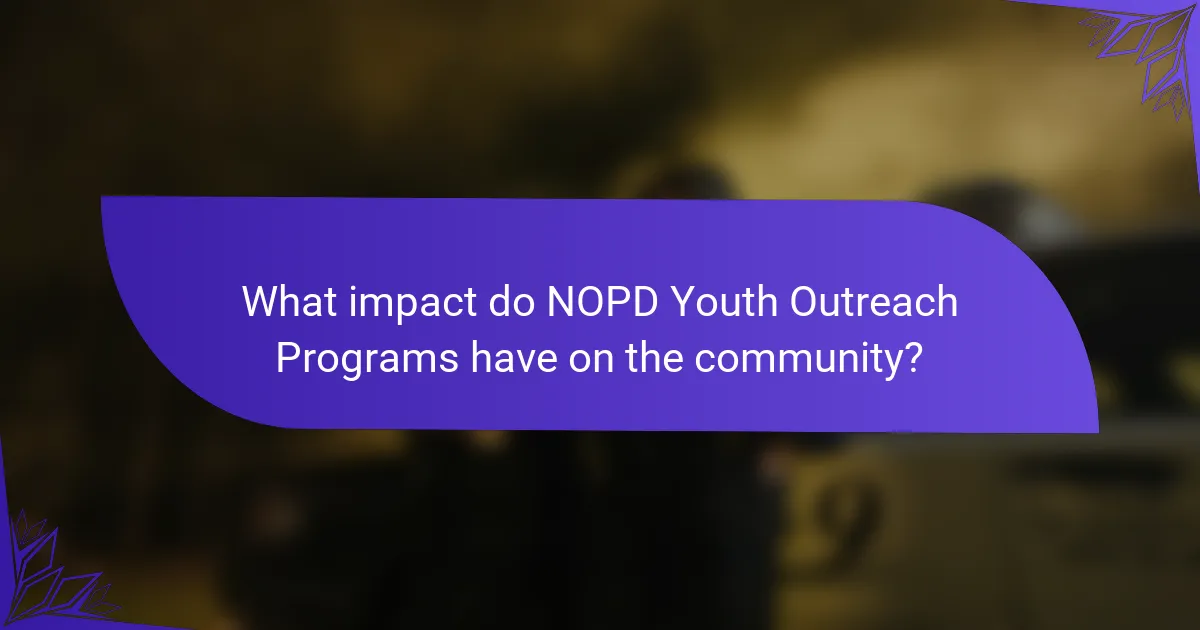
What impact do NOPD Youth Outreach Programs have on the community?
NOPD Youth Outreach Programs positively impact the community by reducing youth crime rates and fostering positive relationships between police and young people. These programs provide mentorship, life skills training, and recreational activities. They engage youth in constructive activities, diverting them from potential criminal behavior. According to the NOPD, youth crime in participating neighborhoods decreased by 25% over three years. Community feedback indicates increased trust in law enforcement and improved perceptions of safety. By promoting community involvement, these programs help build a supportive environment for at-risk youth.
How do these programs influence youth behavior and attitudes?
NOPD Youth Outreach Programs positively influence youth behavior and attitudes by fostering community engagement and providing mentorship. These programs offer structured activities that promote teamwork and leadership skills. Participation in these programs has been linked to reduced delinquency rates among youth. A study by the National Institute of Justice found that youth involved in community programs exhibit improved social skills and increased self-esteem. Additionally, these programs create safe spaces for youth to express themselves and develop healthy relationships. This supportive environment encourages positive decision-making and reduces the likelihood of engaging in risky behaviors. Overall, NOPD Youth Outreach Programs play a crucial role in shaping the attitudes and behaviors of young individuals in the community.
What evidence supports positive changes in youth participants?
Evidence supports positive changes in youth participants through various metrics and studies. For instance, a study by the National Institute of Justice found that youth involved in community outreach programs showed a 30% reduction in delinquent behavior. Additionally, surveys conducted post-program participation indicated a 25% increase in self-esteem among participants. Reports from the NOPD Youth Outreach Programs highlighted improved academic performance in 40% of youth involved. Furthermore, community feedback noted enhanced relationships between youth and law enforcement, fostering trust. These statistics and qualitative findings demonstrate the effectiveness of outreach programs in promoting positive youth development.
How do community perceptions of law enforcement change as a result?
Community perceptions of law enforcement change positively as a result of youth outreach programs. These programs foster trust and communication between police and community members. Increased interaction leads to improved understanding of law enforcement roles. Youth engagement helps dispel negative stereotypes about police. Programs often include educational workshops that inform youth about legal rights and responsibilities. Positive experiences with officers can enhance community support for law enforcement initiatives. Statistics show that communities involved in outreach report higher satisfaction with police services. This shift in perception can lead to greater cooperation in crime prevention efforts.
What challenges do NOPD Youth Outreach Programs face?
NOPD Youth Outreach Programs face several significant challenges. Limited funding restricts their ability to expand services and reach more youths. High turnover rates among staff affect program consistency and effectiveness. Additionally, community mistrust can hinder engagement with local youth. There is also competition from other organizations for the same target demographic. These factors collectively impact the overall success of the outreach initiatives.
How do funding and resource limitations affect program delivery?
Funding and resource limitations significantly hinder program delivery. Limited funds restrict the availability of essential materials and personnel. Programs may face staff shortages, leading to reduced interaction with participants. Insufficient resources can also limit the scope of activities offered. This can result in a lack of engagement opportunities for youth. Furthermore, inadequate funding may affect outreach efforts and community awareness. Programs might struggle to maintain quality and consistency. Studies show that effective youth outreach programs require stable funding to achieve desired outcomes.
What strategies are employed to overcome these challenges?
NOPD Youth Outreach Programs employ various strategies to overcome challenges. One strategy is building partnerships with local schools and community organizations. These partnerships enhance resource sharing and support for youth initiatives. Another strategy is implementing mentorship programs that connect youth with positive role models. This approach fosters trust and guidance for participants. Additionally, the programs utilize community engagement events to raise awareness and gather feedback. These events help tailor services to specific community needs. Training staff in cultural competency also addresses challenges related to diverse youth populations. By employing these strategies, NOPD Youth Outreach Programs effectively navigate obstacles and promote positive outcomes.
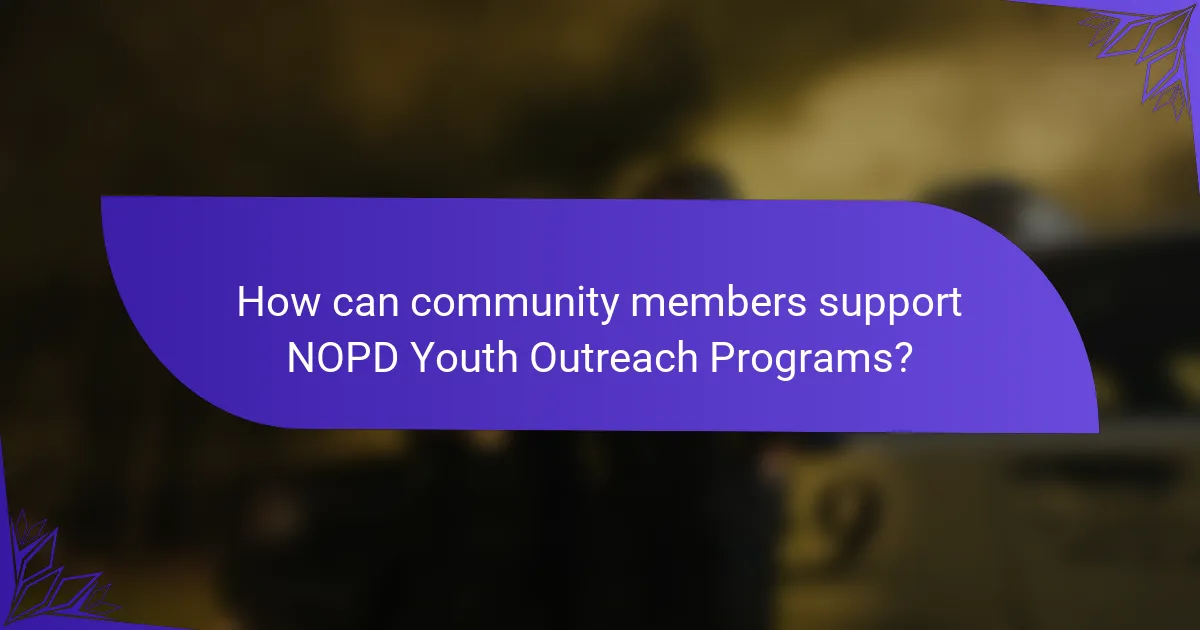
How can community members support NOPD Youth Outreach Programs?
Community members can support NOPD Youth Outreach Programs by volunteering their time and skills. They can participate in events and activities organized by the programs. Donations of resources, such as school supplies or sports equipment, are also beneficial. Community members can advocate for the programs by raising awareness within their networks. Mentorship opportunities for youth can be provided by local professionals. Additionally, attending community meetings helps to strengthen the connection between the programs and the public. Collaborating with local businesses for sponsorships can enhance program funding. Engaging in fundraising efforts can further support the initiatives of the NOPD Youth Outreach Programs.
What volunteer opportunities are available for community involvement?
Volunteer opportunities for community involvement include mentoring youth, organizing community events, and participating in neighborhood clean-ups. Local organizations often seek volunteers for educational programs and after-school activities. Many community centers provide platforms for volunteers to engage with residents. Nonprofits frequently require assistance with fundraising and outreach efforts. Schools may offer opportunities for volunteers to support extracurricular activities. The NOPD Youth Outreach Programs specifically invite community members to assist with their initiatives. Engaging in these activities fosters connections and improves community well-being.
How can individuals contribute to program sustainability?
Individuals can contribute to program sustainability by actively participating in outreach initiatives. Engaging in volunteer activities helps build community support. Providing feedback can improve program effectiveness and relevance. Donating resources or funds can enhance program capabilities. Advocating for the program within the community raises awareness and support. Building partnerships with local organizations strengthens program networks. Attending events fosters community involvement and interest. These actions collectively ensure the longevity and success of youth outreach programs.
What best practices can enhance the effectiveness of these programs?
Effective best practices for enhancing NOPD Youth Outreach Programs include establishing strong community partnerships. Collaborating with local organizations increases resource availability and community trust. Incorporating youth feedback into program design ensures relevance and engagement. Regular training for program staff improves interaction skills and cultural competency. Utilizing data-driven approaches helps in assessing program impact and guiding improvements. Consistent evaluation and adaptation of activities based on outcomes enhance effectiveness. Engaging families in program activities fosters a supportive environment. Lastly, promoting visibility through community events raises awareness and participation.
NOPD Youth Outreach Programs are initiatives by the New Orleans Police Department designed to engage youth in the community through mentorship, education, and recreational activities. The programs aim to build positive relationships between police officers and young people, focusing on crime prevention and personal development. Key components include workshops, sports events, and community service projects, which have been shown to reduce juvenile crime rates and improve community relations. The article will explore the objectives, operational strategies, activities, and overall impact of these outreach programs on youth behavior and community perceptions of law enforcement.
